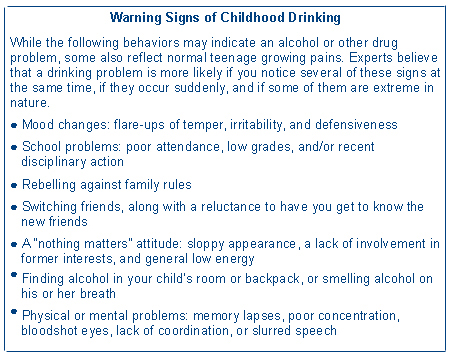Brief Interventions in Medical Care Settings
Brief interventions are short, one-on-one counseling sessions intended for people who drink in ways that are harmful or abusive. They can be given in a matter of minutes, and they require minimal followup. The goals of brief interventions differ from formal alcoholism treatment. Brief Interventions aim to moderate a person’s alcohol consumption to sensible levels and to eliminate harmful drinking practices (such as binge drinking), rather than to insist on complete abstinence from drinking—although abstinence may be encouraged, if appropriate. See: NIAAA, Alcohol Alert, 2005, Brief Interventions, http://pubs.niaaa.nih.gov/publications/AA66/AA66.htm.
Pediatricians and medical professionals in pediatric health care settings are in a pivotal position for helping pre-teens and adolescents who may need substance use counseling and/or treatment. For an article from the American Academy of Pediatrics on substance use screening, brief intervention and referral to treatment for pediatricians, see: http://pediatrics.aappublications.org/content/128/5/e1330.full.
Intervention in Allied Health and Social Service Agencies
As a health care provider, you are in a unique position to prevent, detect, and treat alcohol use in pre- and early adolescence. Health care professionals are also influential members of their communities who can speak knowledgeably about the damage done by underage drinking and ways early alcohol use can be prevented.
In this section you will find warning signs of a drinking problem, questions to ask yourself as a health care provider, and resources that include useful publications and helpful organizations.
As a health care provider, ask yourself the following questions:
- Am I alert to signs of underage drinking during routine physical examinations and office visits and at times of medical emergencies?
- Do I promote the use of public spaces in health care settings to distribute educational literature?
- Do I use my knowledge and expertise about the dangers of alcohol to support community education and prevention programs regarding underage alcohol use?
National Drug and Alcohol Treatment Referral Routing Service
The U.S. Department of Health and Human Services (HHS) Substance Abuse and Mental Health Services Administration’s (SAMHSA) toll-free telephone number for alcohol and drug information/treatment referral assistance.
Telephone: 1-800-662-HELP (4357)
For information on Support and Treatment, see SAMHSA Center for Substance Treatment at: http://www.samhsa.gov/about/topics.aspx.

